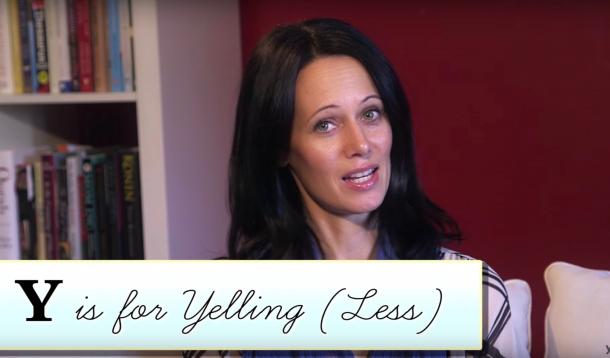
This is the second last video in our twenty-six video series! This episode of our A to Z of Taming Tantrums program is for the letter Y, and Y is for Yelling (less). When we yell less, our children will too, so this is a win-win endeavour for everyone.
YES! I know how hard that is. I also know that deciding to yell less is a big commitment that happens eventually over time. When I realized my voice was loud more than it was soft, I made a conscious decision to dial down my tone with my children. Having worked on this over the past five years, I can say that the first year I was able to stop myself from yelling about half of the time, but now, I can stop myself 95 percent of the time. Yes, there are some shouts that still get through.
In this video I talk about what yelling less does for our family and some strategies for accomplishing this task:
There is a difference between yelling loudly for safety and yelling in a way that hurts our child's core belief development. In this post I discuss the difference between the two and how to make sure we are not inadvertently shouting things that might leave a scar.
Please be kind with yourself as you work on this yelling-less parenting goal. Some days you will feel great about your ability to lower your voice, and some days you'll regret how you interacted with your children. We've all done this! You are certainly not alone. Carry on knowing that just remembering that you want to yell less is wonderful and that over time this goal can be accomplished.
Do you have any questions? Please feel free to post those in the video comment field or over on my Facebook page.
We're so excited to share with you the A to Z of Taming Tantrums video series!
Each week we'll share the next letter of the alphabet and Andrea will discuss how it relates to reducing tantrums - and improve our experience as parents! You can view each video here as they are added each Friday.


As parents, there are countless demands on our time, energy, and attention. And because we love our children as much as we do, we gladly give our time, energy, and attention to them. Even though we do this, it is important for parents to set boundaries on how much of these valuable personal resources we give away – not just for our own benefit, but for our children’s sake as well.
Reasons to Set Boundaries on Ourselves:
Self-care is critical to caring for others. We have all heard it before: put on your own oxygen mask before putting one on your child. The reason is simple: if we don’t take care of our own basic needs, we will not be able to care for, protect, and help our children. If we are constantly filling the needs of others’ – including our children – eventually we will have nothing left to give.
Signs that my energy bucket is near depletion include: snippiness, exhaustion, and a general sense of frustration. When I start to feel like this, I take a close look at my behaviors to see if the scales may have tipped such that I am not doing things to fill my bucket, so to speak.
As I have written before, simple things like taking a walk around the block, exercising (even for a short time), and reading a good book can help replenish depleted energy reserves. I make sure to mention to my children that I do activities like yoga and ride my bike because they are things that help me feel better.

Waiting to help teaches our children independence. For instance, if I hear a cry for help and can tell there is no immediate danger, I do the “slow walk” toward a child. By taking my time in coming to the child’s aid, I am giving the child a chance to process what’s happened and start thinking of solutions. Many times, by the time I reach the child, they will have figured out a solution or calmed themselves down – and then I can congratulate them on figuring it out for themselves.
Boundaries teaches patience and confidence. Habitually rushing to tend to a child’s needs can not only deplete our own energy reserves, but it can also inadvertently send the message that we lack confidence in the child’s abilities and foster a sense of impatience with the process.
If we consistently rush to tie a child’s shoes, he or she may not learn the slow practice of tying their own shoes. What’s more, if we constantly say “let me tie your shoes for you,” the child may start to question their ability to tie their own shoes. By taking a step back, we can save our energy for those times when our help is essential and give our children a boost of confidence and a lesson in patience.
Setting limits on our time, attention, and energy helps us value the person behind the parent. All too often, we parents put the needs of our children first and let our own needs slip to the bottom of the list – or off the list entirely. When we consistently let our needs fall to the bottom of the list, we miss out on the opportunity to bring the Connect Four Pillars into practice.
I joke with my children that I won't get up from my meal unless they are bleeding or on fire. They laugh at me but they know to let me be while I'm sitting at the table, eating. I will admit that I let my dinner-eating take much longer than it really needs to. When they ask for help, I usually give them a "when/ then" like this: "When I'm finished my dinner, then I can help you find Henry (the purple stuffed hippo)."
One of the biggest struggles parents have is maintaining their own sense of self, and tending to their own needs, while also caring for their children. In fact, this has been one of my own biggest struggles with parenting. But once I learned to keep my own energy bucket full through techniques such as ones discussed above, I became a better mom and a happier person – with more to give to those I love.
Setting boundaries is a long process, and don’t fret if it takes time to implement. Remind yourself and your children that healthy boundaries are an essential part of a healthy relationship, and that your boundaries are the manifestation of your core beliefs as part of the Connect Four Pillars of parenting. The ways that parents keep their energy bucket full, and the boundaries that parents create, will likely be different for everyone, but the result is the same – the more energy we have, the more love we can give. Do you have any questions or comments? Feel free to post those here or over on my Facebook page.